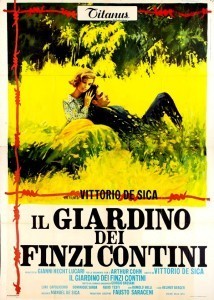The Garden of the Finzi-Contini: Tennis, Longing and Doom
Vittorio De Sica’s award-winning film The Garden of the Finzi-Contini, recently restored and reissued, approaches the Holocaust from an oblique angle, stopping short of the barbed wire and chimneys strewing human ash. The film, largely faithful to the Giorgio Bassani novel from which it was adapted, has eclipsed the book for decades, yet the original is well worth reading, whether or not one has seen the film.
 Bassani, writing autobiographically in the aftermath of the carnage, tells his story in the first person as if reliving the bittersweet years preceding the Finzi-Contini’s demise. A sympathetic narrator Giorgio is not. He portrays himself as no better or worse than the characters who surround him, a Jewish elite who are steadily losing their freedoms, livelihoods and dreams.
Bassani, writing autobiographically in the aftermath of the carnage, tells his story in the first person as if reliving the bittersweet years preceding the Finzi-Contini’s demise. A sympathetic narrator Giorgio is not. He portrays himself as no better or worse than the characters who surround him, a Jewish elite who are steadily losing their freedoms, livelihoods and dreams.
Although De Sica is best known as a Neo-Realist filmmaker, in The Garden of the Finzi Contini he lapses into the sort of soft-focus nostalgia common when chronicling a lost way of life. Bassani, too, in his lush yet distanced prose conveys a certain wistfulness, but ultimately the novel is a confession—of human pettiness, failure of spirit, and indelible guilt. The power of this confession does not quite hold in the film, however evocative the cinematography or convincing the performances.
Is there a place within the literature of the Holocaust for works like Bassani’s that intentionally remain on the fringe of the violence where there are neither heroes nor villains, only imperfect human beings lethally distracted by quotidian preoccupations? What do they have to teach us?
Bassani quotes from I promessi sposi, “The heart, to be sure, always has something to say about what is to come, to him who heeds it. But what does the heart know? Only a little of what has already happened.”
come, to him who heeds it. But what does the heart know? Only a little of what has already happened.”
The author, unable to rectify the past, grapples in this thinly disguised memoir to enshrine its ghosts. Readers who come to The Garden of the Finzi-Contini looking for answers find instead a tormented plea for understanding by an imperfect man who survived, remembering those who did not.

Germaine Shames' Blog
- Germaine Shames's profile
- 10 followers



